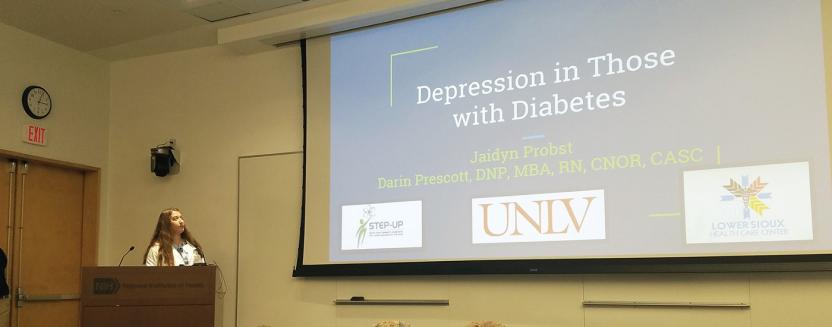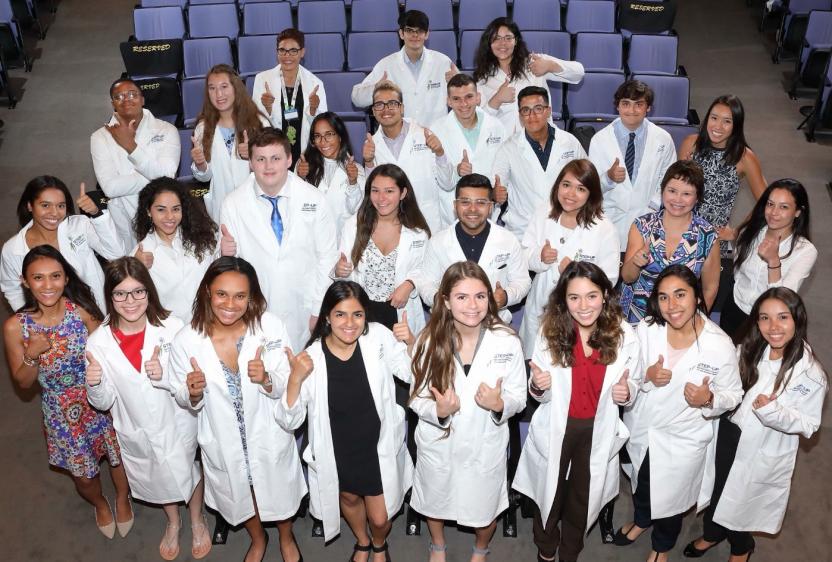Jaidyn Probst is a high school senior living in Redwood Falls, Minnesota. Redwood Falls is a small, rural town of about 5,000 people — small enough that, according to Jaidyn, everyone knows everyone, which is probably her favorite part. She enjoys creating art, reading, listening to music, and spending time with friends and family. Also, she really doesn’t like doing the dishes.
Jaidyn is Bdewakantunwan (Spirit Lake Dwellers) Dakota and comes from Cansayapi (Where They Paint the Trees Red), otherwise known as the Lower Sioux Indian Community, about 7 miles down the road from Redwood Falls. I got to know Jaidyn when ChangeLab Solutions visited the Lower Sioux and met with the Lower Sioux Health and Human Services Advisory Committee (LSHHSAC) to collaborate on some of their health work. This group is tasked with increasing community engagement in order to establish a sustainable food system for the Lower Sioux Indian Community. Their primary goals are improving access to healthy food, connecting the community to indigenous foods, and creating healthier families.
It was soon evident to me, as I imagine it is to anyone who interacts with her, that Jaidyn is a community leader in her own right. Her sense of empowerment and interest in local policy and health issues are emblematic of a community that is healthy and genuinely invested in community engagement.
I checked in with Jaidyn to learn more about her work, what inspires her, and what she’s been able to contribute to her community as a young person.
I think I know about a tiny sliver of your many hats and endeavors, but please tell me a bit about yourself and what you’re involved in.
Over the summer, I was selected as a Short-Term Research Experience for Underrepresented Persons (STEP-UP) student. I worked at the Lower Sioux Health Care Center, researching health issues such as diabetes and supporting the health care center’s programs and activities. I just found out that my research is going to be published in the Journal for Health Disparities Research and Practice, which is exciting!
I was also recently appointed to the Minnesota governor’s Young Women’s Cabinet. I am hoping to get my Bachelor of Health Sciences and then go on to medical school and become a pediatrician. I believe that kids get a foundation for their health at that young age, and I’d like to come back to the community as a pediatrician one day.
Wow, you are on a roll! Why are you so passionate about community health?
I became interested in this primarily from being exposed to it through leadership opportunities. I have always had a passion for health care, but I became interested in the health of our community once I joined the health and human services committee [LSHHSAC].
Right, and that’s where we met. How did you get involved with the LSHHSAC?
An application came about 2 years ago, and I decided to apply just because I knew it would be a way to become more involved with my community. I am a youth ambassador for the committee, so I basically help with activities for the youth. But I also am able to give a perspective at meetings from a teenage point of view, so the adults can get information about local youth that they might not have otherwise had.
A specific goal of the LSHHSAC is to establish and implement guidelines for the community’s food and beverage retail environment. Can you describe food retail in the Lower Sioux community?
It basically is just the C-store, which is a gas station with limited real food. People can go into town about 7 miles away to the grocery store in Redwood Falls, but if they can’t get there, then the C-store is their only real choice. The C-store is very understocked on real food such as fresh produce, milk, bread, and other healthy items.
Why focus on food? Why are food policies important for the community?
It is important because if a person doesn’t have the means to get somewhere else to buy food, the food available in the community is all they have, so it makes sense to make it as adequate and healthy as possible. People don’t have to sacrifice their health just because the food is unavailable. For example, if a blizzard comes through and they can’t make it into town, they should be able to go to the C-store for sustainable food.
You helped us prepare some workshops on healthy food retail for a group of youth, ages 13–15, who were participating in a summer work program. Why was it important to involve this group, educate them about retail marketing strategies, and get their input on potential changes to the food environment?
I think it is important so people in the area can have quick access to healthy foods without having to travel to the next town for a grocery store. It is important to involve young people because they need to be educated about what is healthy. They also need to know that this is going to impact their future and that the changes they want to make can become a reality within their lifetime.
The workshops definitely resonated with the youth. They all were very interested in fixing the store and adding some new, healthier choices. I have had some of the kids come up to me, and they are still talking about how cool it was that we asked for their ideas.
Let’s talk more that — about involving young people. Why is the youth perspective valuable for community change and decisionmaking groups like the LSHHSAC?
If adults don’t have kids or aren’t around kids, they might not know of the issues that are affecting young people, so that is one thing that youth can provide. I personally really enjoy being on the [LSHHSAC] as a youth because I learned a lot about policy work. It helps to have a variety of ages on the committee because everyone has something to offer, something to bring to the table.
I also bring my connections to the group. If they are discussing a community event, I can make sure that youth my age are involved. I also can give them insight on what youth might think about the changes that we are implementing.
What are some common misconceptions that people have about engaging young people?
A lot of adults think that young people don’t care and that they are only buried in their phones and don’t care about changing or helping the world. There are plenty of youth that are interested in policymaking, so they shouldn’t just brush youth off as not caring. I just want [adults] to think back to when they were a kid. Obviously, when they were young, they cared about something.
Noted! Okay, last question. What excites you? What do you hope for your future?
I am excited by the fact that I can change things, that I have a voice that can be used to sway decisions about my future.
_____
Nessia Berner Wong, MPH, is a senior policy analyst at ChangeLab Solutions. Her work focuses on food systems, including equitable procurement, healthy vending, and federal food policy.
Jaidyn Probst will attend Harvard University as a freshman beginning fall 2019. She plans on majoring in Neuroscience with a minor in Psychology.
For more information, follow the work of the Lower Sioux Health Care Center.
5/22/2019

